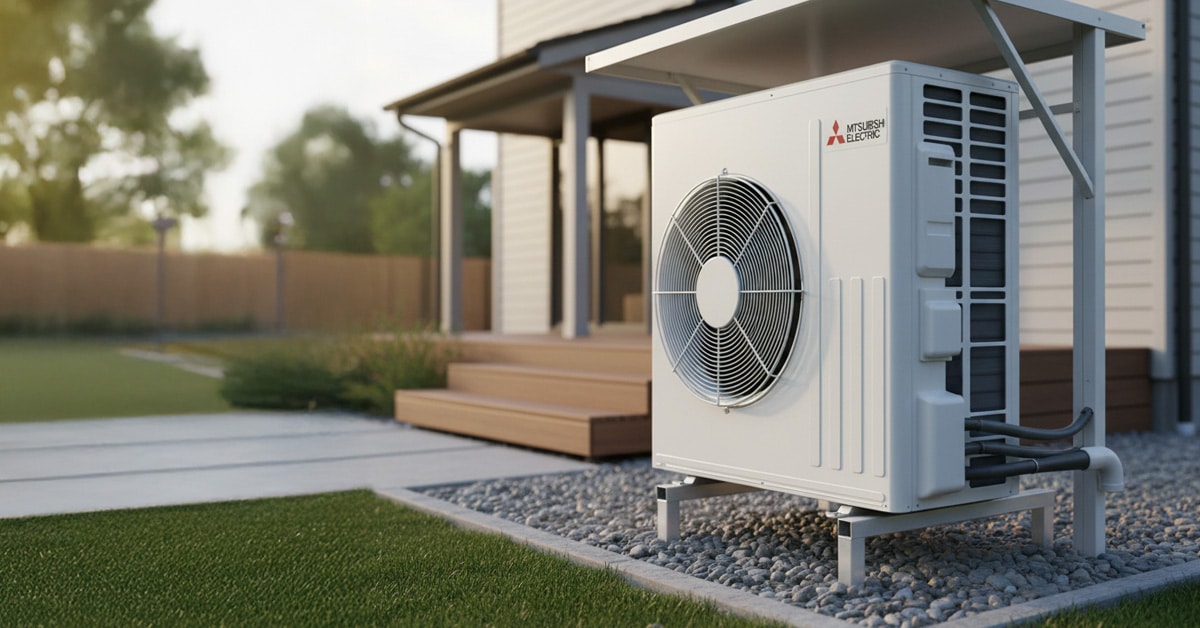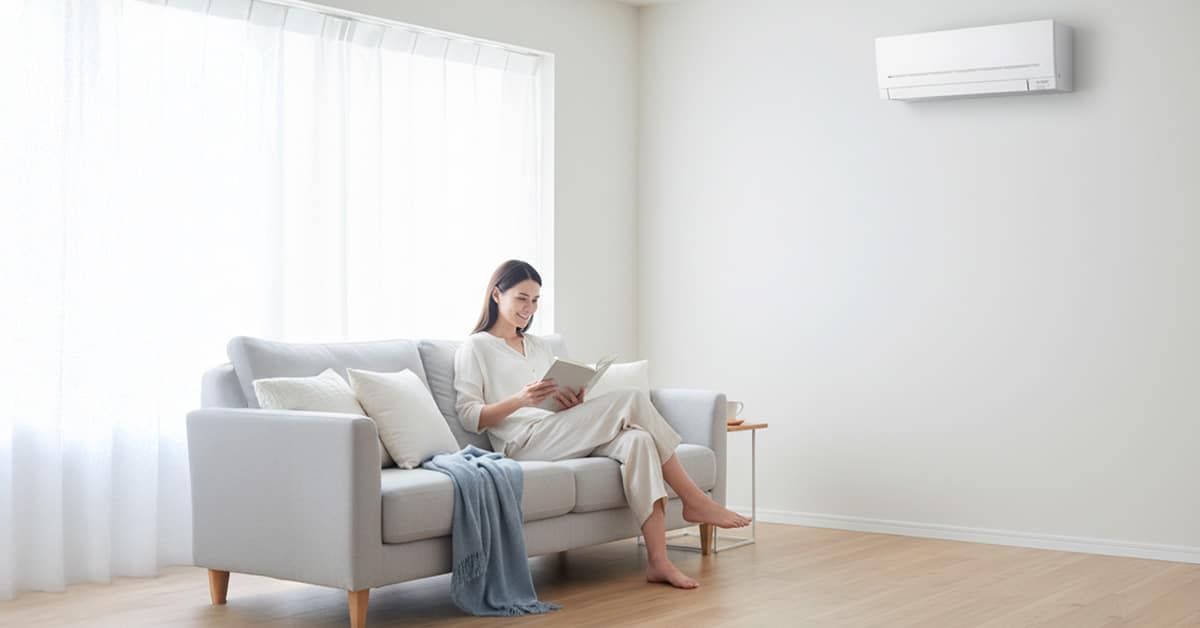Many Hamilton homeowners wonder where to place their Mitsubishi heat pumps for the best results. Placement matters more than most people think. A good spot helps the unit run quietly, heat your home evenly, and use less power. If the unit is in the wrong place, you might notice uneven temperatures and higher energy bills.
At Hamilton Aircons, we have installed and relocated hundreds of systems across Waikato homes. Every property is different, but the goal is always the same: to find a quiet and efficient spot that fits how you live.
This guide covers the best locations for indoor and outdoor units, explains how Hamilton’s climate affects performance, and shares professional tips that keep your home warm and peaceful all year.

The placement of a Mitsubishi heat pump directly affects how well it heats or cools your home. Even a top-quality Mitsubishi model will not perform properly if it is placed in the wrong spot.
Good airflow is the foundation of comfort. When the unit sits where air can move freely, it warms or cools the entire space evenly. If blocked by furniture or corners, temperature imbalances appear quickly.
Mitsubishi heat pumps are known for their quiet operation. Still, if the wall is thin or the outdoor space is small, sound can bounce around. Choosing the right spot helps keep your system as quiet as possible.
If a Mitsubishi heat pump has to work too hard to heat or cool your home, it will use more electricity. Putting it in the right place helps it sense the room better and keep the temperature steady without wasting energy.
Indoor units need careful positioning to achieve the right airflow, comfort level, and noise control.
The indoor unit works best on a central wall where air can move easily. This way, warm or cool air spreads evenly through the room instead of gathering in one spot.
Try not to place the unit in direct sunlight. Too much sun can make the sensors less accurate and put extra strain on the Mitsubishi heat pump system.
The area in front of the unit should remain clear. Avoid hanging frames, curtains, or furniture that block airflow.
When homeowners ask the best place to install a Mitsubishi heat pump in Hamilton, these guidelines usually offer the right starting point.
The outdoor unit, or condenser, plays a key role in how efficiently your system operates.
Make sure there’s plenty of space around the outdoor unit so air can move easily. Good airflow helps the Mitsubishi heat pump operate more efficiently and use less energy.
Place the outdoor unit on a solid, flat surface, such as a concrete pad or a sturdy bracket. This helps stop vibrations and keeps noise from traveling into your home.
Even the quietest systems can make some background noise. Try to keep the outdoor unit away from bedrooms or busy windows to keep things peaceful indoors.
Place the outdoor Mitsubishi heat pump in a spot with good airflow, and make sure it’s protected from leaves, dirt, and water that could collect around it. This helps prevent damage and keeps it running well for longer.
Placing the outdoor unit in the right spot helps your system run efficiently and last longer.
Not all spots are suitable for installation. Choosing the wrong position can lead to unnecessary energy loss and uneven heating from your Mitsubishi heat pump.
These are some of the common Mitsubishi heat pump placement mistakes to avoid in NZ, and correcting them often makes a noticeable difference in comfort and power bills.
If the unit isn’t in the right place, you might hear more noise, have trouble keeping the temperature steady, or notice it turning on and off a lot. These problems can make the system less efficient and wear it out faster.
Hamilton’s weather can change fast, and it often gets humid. Placing your Mitsubishi heat pump in the right place helps it better handle these conditions.
Since Hamilton has damp winters, it’s important to think about airflow. Place the indoor unit so it can move air across walls or open areas to help prevent moisture from building up.
Outdoor units need to handle cold, damp mornings and warm afternoons. Keeping the unit raised and away from places where water collects helps prevent rust and keeps it working well for years.
If your home has poor insulation or multiple levels, you’ll need to be extra careful about where you place the indoor unit. Aim the airflow toward open spaces or stairwells to help spread heat throughout the house.
One reason homeowners choose Mitsubishi systems is their reputation for quiet operation. Still, placement can make a big difference in how that quietness feels in daily use.
Mount the indoor unit on a sturdy wall to reduce vibration. Try not to use thin walls or walls next to bedrooms. A solid fence helps stop movement and keeps noise from spreading.
Big rooms without much furniture can make even quiet sounds seem louder. Placing the unit away from corners and hard surfaces helps reduce echo.
When deciding where to position an indoor Mitsubishi heat pump unit for best airflow, also consider the noise level in each room. Bedrooms benefit from units mounted slightly higher and angled away from the bed for quieter performance.
These small changes can help your system stay as quiet as the best Mitsubishi heat pumps in New Zealand. Energy Efficiency Starts with Smart Placement
Putting your Mitsubishi heat pump in the right place makes your home more comfortable and can help you save money on power bills.
When air can move easily, the system doesn’t have to work as hard. This means it uses less energy and doesn’t have to make up for hot or cold spots.
If the unit isn’t in a good spot, it might turn on and off more often. Every time it starts up, it uses extra power, which can raise your bills. The right placement helps it run smoothly and efficiently.
In Hamilton homes, it’s best to direct airflow toward the main living areas rather than hallways or corners. With careful placement, your home stays warm without wasting energy or overheating.

Every home in Hamilton is different, with its own layout, insulation, and outdoor space. That’s why we always do a full site check before installing your system.
Our technicians are trained to install Mitsubishi heat pumps to manufacturer standards. We calculate distances, airflow angles, and wall stability before any work begins. This ensures every system runs at peak efficiency.
A professional assessment helps you avoid problems like excess noise or uneven heating that can occur if the unit isn’t installed correctly.
Even a great installation can lose efficiency if it’s hard to keep up with regular maintenance.
Ensure technicians can easily access both indoor and outdoor units. Leave enough space for cleaning, changing filters, and checking parts.
Clean or replace indoor filters regularly to keep air moving well. If the unit is too high or in a tight spot, it’s easy to forget this critical step.
Keep leaves, grass, and dirt away from the outdoor unit. In wet weather, check that water can drain away easily.
Simple access planning during installation saves time and protects your system from unnecessary wear.
Sometimes, the Mitsubishi heat pump in your home isn’t in the best spot.
Moving your unit to a better spot can really improve how well it works and how comfortable your home feels. It can also help the system last longer by reducing wear and tear.
We can check your current setup and let you know whether moving the unit would improve airflow or reduce noise. We aim to make sure your system keeps your whole home comfortable.
Mitsubishi heat pumps are built with care, so it’s important to follow their placement guidelines closely.
We follow Mitsubishi Electric installation guidelines, including maintaining proper clearance distances, avoiding moisture-prone areas, and ensuring firm mounting for both indoor and outdoor units.
Hamilton homes vary from modern builds to older villas. We consider wall materials, ceiling height, and window direction to adapt Mitsubishi’s general recommendations to local conditions.
By paying attention to these details, we make sure your system runs quietly and efficiently for years.
Where you put your Mitsubishi heat pump can make a big difference in how much it costs to run over time.
When air flows well, your system uses less power. Even small changes in placement can lower your energy bills over time.
If the unit is in a good spot, its parts don’t wear out as quickly. This means fewer breakdowns and easier maintenance.
A well-placed system runs under steady conditions, which helps it last longer. Putting your Mitsubishi system in the right place is one of the easiest ways to protect your investment.
Quiet, efficient comfort begins with a smart installation. Knowing where to install your Mitsubishi heat pump really affects how well it performs year-round.
At Hamilton Aircons, we carefully plan every installation, thinking about wall strength, airflow, and noise. Our goal is to make your home as comfortable and efficient as possible, no matter its size or shape. If you’re thinking about installing or moving your unit, now’s a great time to do it. The right placement will help your Mitsubishi heat pumps run quietly, heat your home evenly, and save energy every season.